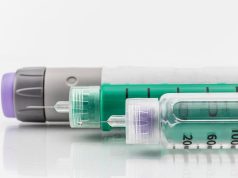Targets vagus nerve which regulates hunger
WEDNESDAY, Jan. 14, 2015 (HealthDay News) — A new electrical stimulation device designed to control obesity by targeting the nerve pathways between the brain and stomach that regulate hunger and fullness has been approved by the U.S. Food and Drug Administration.
The Maestro Rechargeable System is the first FDA-approved obesity device since 2007, the agency said Wednesday in a news release. It is sanctioned for adults with a body mass index (BMI) between 35 and 45 kg/m², with another obesity-related condition such as type 2 diabetes, who haven’t been able to lose enough weight with an approved weight loss program. The system includes a rechargeable pulse generator and wire electrodes that are implanted in the abdomen. The electrodes stimulate the vagus nerve, which carries signals to the brain that the stomach feels empty or full, the FDA said.
The device’s safety and effectiveness were evaluated in studies involving 233 people with a BMI of 35 kg/m² or greater. People who used the device for 12 months lost about 8.5 percent more excess weight than people who didn’t use the device, the FDA said. The most serious side effects included nausea, neuroregulator-site pain, vomiting, and surgical complications. More common but less serious side effects included heartburn, problems swallowing, belching, mild nausea, and chest pain.
As a condition of approval, device maker EnteroMedics (based in St. Paul, Minn) must conduct a five-year, follow-up study involving at least 100 users, the FDA said.
Health News Copyright © 2015 HealthDay. All rights reserved.








